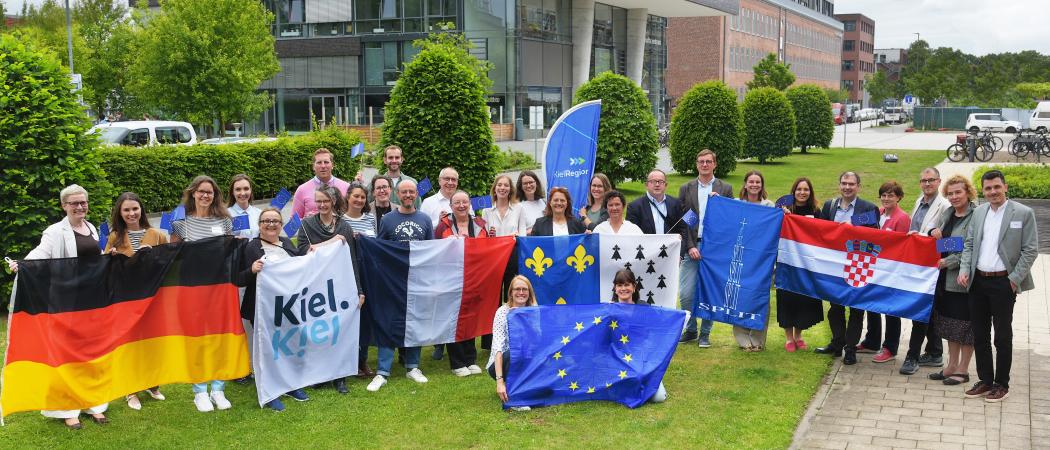
Photo credits: Kiel University
Today marks the official launch of Science Comes to Town, a flagship EU-funded initiative uniting the international EU project “Science Comes to Town”, spearheaded by the cities and regions of Kiel, Brest, and Split alongside more than 70 European institutions and the SEA-EU Alliance (European University of the Seas). With €6 million in funding from the Europena Commission, the project set the stage for a vibrant year-long celebration of science in 2026.
The initiative seeks to build stronger connections between science and society by bringing research into the heart of European communities. Key themes include the protection of our oceans, cultural heritage, nurturing young talents, and health and wellbeing. Science Comes to Town aims to make science not only visible but also tangible and accessible – right in the heart of towns, cities, and communities. By bringing research into everyday life, the project seeks to build trust in scientific knowledge, strengthen Europe’s capacity for innovation, and highlight the value of evidence-based decision-making.
Split to Host Grand Opening of the Year of Science
The project’s inauguration will take place in January 2026 with a spectacular opening event in Split. The Croatian city will welcome all project partners for a gathering of minds and ideas.
“Split is honoured to host the launch of Science Comes to Town. Whether it’s about reimagining public spaces, promoting urban sustainability, or bringing innovation closer to our communities, bold solutions emerge through collaboration — across science, policy, industry, and civil society. That demands openness, trust in one another’s expertise, and the courage to embrace new perspectives. Our opening conference will spark the conversations needed to shape a better future,” said the City of Split.
Empowering the Next Generation of Scientists in Kiel
In Kiel, the focus will be on inspiring the next generation of scientists. Activities will target schools, teachers, and young people through expanded programmes such as “Rent-a-Scientist”.Its French counterpart will also be expanded, and successful formats like children’s universities will be relaunched and shared with new cities.
Citizen science and co-creation projects will offer hands-on experiences, where young people can discover the importance of reproducibility and learn practical data management skills – both in the classroom and during events such as EUCYS (the European Union Contest for Young Scientists).
“I’m especially thrilled that EUCYS, one of Europe’s most prestigious science competitions for youth, is coming to Kiel. It sends a strong signal in support of education, innovation, and international collaboration,” said Dr Ulf Kämpfer, Mayor of Kiel.
Brest to Showcase Research-Driven Innovation
In Brest, the focus will be on sparking innovation – and that means investing in young talents. At a time when many research and innovation sectors are facing skills shortages, it’s more important than ever to inspire young people to consider careers in science.
The project’s activities in Brest are designed to bring research to life, foster interaction with young innovators, and build vital skills such as teamwork, communication, and entrepreneurship. Early-career researchers will also receive targeted support to help them navigate Europe’s diverse research ecosystem with confidence.
A key event in Brest will be EU TalentOn, the European Union Contest for Early-Career Researchers, where young talents from across Europe will join forces in interdisciplinary teams to tackle urgent challenges – from sustainable urban development to the ethical use of AI. “With EU TalentOn, we are bringing Europe’s brightest young minds to Brest. It’s a celebration of creativity, collaboration, and scientific excellence,” said François Cuillandre, Mayor of Brest and President of Brest métropole.
Looking Ahead: Spotlight on European Researchers’ Night
The project will make its public debut on 26 September 2025 during the European Researchers’ Night. Simultaneous events in all three cities will feature live science experiments, talks, music, and hands-on stations.
“The European Researchers’ Night is the perfect launch for our coming Year of Science,” said Ulrike Wielatt, Managing Director of KielRegion GmbH. “Each region will shine with its own unique and inspiring programme – and at the same time, we’re building bridges across borders. Planned highlights include international activities such as a ‘Science Battle’ between the citizens of Kiel, Brest and Split. Look forward to fascinating insights, creative formats, and a vibrant sense of community – science will come to life in unexpected ways!”
Background: About “Science Comes to Town”
The initiative builds on the legacy of the European City of Science, a title held by one European city every two years– most recently Leiden in 2022 and Katowice in 2024. The new format expands this vision across multiple cities, contributing to the European Research Area and the EU Pact for Research and Innovation, with a strong focus on citizen engagement and social responsability
More information on the project and the partners:
www.science-comes-to-town.eu






 A unique international forum for public research organisations and companies to connect their external engagement with strategic interests around their R&D system.
A unique international forum for public research organisations and companies to connect their external engagement with strategic interests around their R&D system.